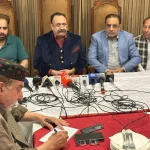ISLAMABAD: In scathing criticism against India for its unwillingness to resolve the longstanding Kashmir dispute, army chief General Raheel Sharif on Monday accused India’s premier spy agency of spilling the blood of innocents through an ‘indirect strategy.’
The hard-hitting statement, which coincided with Indian External Affairs Minister Sushma Swaraj’s speech at the UN General Assembly session in New York, came during a conference of the army chiefs of regional countries in Germany.
Organised by the commander of US Centcom, the day-long conference was attended by military chiefs from Pakistan, Afghanistan, Kazakhstan, Kyrgyzstan, Tajikistan, Turkmenistan and Uzbekistan.
“Participants expressed their desire to improve multilateral military cooperation amongst their countries in order to coherently meet the emerging security challenges and jointly defeat the menace of terrorism comprehensively,” said a statement issued here by Inter-Services Public Relations (ISPR).
In his address, the army chief highlighted the regional security environment, common challenges and the way forward for the participating countries. He said Islamabad’s counter terrorism efforts had turned the tide against terrorism in the country and added that Pakistan was the biggest victim of terrorism both in terms of human lives and finances.
While elaborating the concept and success of Operation Zarb-e-Azb, Gen Raheel said Pakistani security forces valiantly fought terrorists upfront through an across the board, indiscriminate operation against terrorists of all hue and colour along with their abettors, financiers and sympathisers. He said that with the unflinching support of entire nation, terrorists’ ideologies and their narrative had been defeated and their sanctuaries and hideouts completely eliminated.

“Our efforts against the residual threat are still continuing and can’t be entirely eliminated without optimum cooperation between neighbouring countries,” he said. He pointed out that success of Pakistan’s counter-terrorism operations was a common dividend which should be optimised and shared.
The army chief also offered regional countries to benefit from Pakistan’s initiative and experiences in terms of regulation of cross border movement, socio-economic development of border regions and enhanced cooperation in terms of intelligence sharing.
General Raheel listed the country’s porous Western border and existence of some exploitable spaces, inadequate border management that allows terrorists move, lack of synergy, coordination and institutionalised mechanism of intelligence sharing as some of the major challenges to take the fight against terrorism to its logical end.
“These challenges were being exploited through confrontationalist and subversive approaches by hostile Intelligence agencies like RAW that spills blood of innocent people through indirect strategy,” he alleged. Highlighting the ongoing atrocities in Indian-Occupied Kashmir, the army chief said India was unwilling to address historical disputes that directly fan misunderstanding and feed into persistent regional culture of conflict.
Gen Raheel offered unlimited and sustained support to all participating countries in the conference particularly Afghanistan. He emphasised that route to a peaceful and prosperous region runs through a stable Afghanistan, “which is achievable through comprehensive and coordinated approach.”





